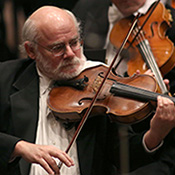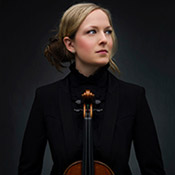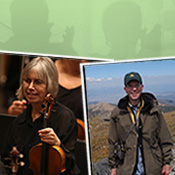
“Music makes us feel; technique helps us get there”: Thoughts on music education and more with violist Nicole Sutterfield
David Lewellen
PUBLISHED
Tagged Under: Concerts for Schools, MSO Musicians, Viola
Back when Nicole Sutterfield did a lot of presentations at schools, she liked to play a few short excerpts on her viola and ask the students for reactions. “They were almost all emotional,” she says. “Happy, sad, it sounds like a funeral, it sounds like bunnies. But it was never ‘You used a lot of slurs,’ or ‘You used all the strings,’ or ‘It was in C major.’”
But then Sutterfield would play the excerpts again, with a new tempo or articulation or changing the mode from major to minor, and the reactions would be different. “The point of music is to make us feel something,” she says, “but it’s through technique that we get there.”
Helping students think technically as well as emotionally is only one challenge. Sutterfield, the MSO’s assistant principal violist, formed very mixed impressions from her years in music education. A student’s experience may vary wildly, depending on the district, the school, and particularly on the teacher.
Before winning the Milwaukee job, Sutterfield worked with public school students through the Los Angeles Philharmonic and the Spokane Symphony. And before that phase of her life, she spoke to 20,000 schoolchildren over the course of her year as Miss Minnesota.
“I had a feeling that would come up,” she says when the tiara is mentioned. “I liked the pageant’s emphasis on talent, so 35 percent of the score I could handle fairly well. And I liked the requirement that contestants have a platform; mine was music education. I put together a guest artist in residence program that reached 84 schools, and I got a lot of solo opportunities with regional orchestras in Minnesota. It gave me a lot of confidence, and it also helped pay down my student loans.”
In her work in Los Angeles and in Spokane, “The kids were different, but it was the same problems, the same issues,” she says. “You can argue about money, about parental involvement, about resources, but the teacher is so key.” And, she says, “There’s a need for some really good curriculum.”
Viola is the underappreciated member of the string section, and like many violists, Sutterfield’s first instrument as a child was violin. But not long after she started, she heard the Minnesota Orchestra’s then-principal violist, Cynthia Phelps, as a soloist, “and I said to my mom, ‘I want to play that,’” Sutterfield remembers. “I loved how the viola sounded. It’s deeper and richer.”
While Sutterfield was leading the life of an office worker and freelance musician, she also married her husband, Matt, a public safety officer in Sunnyvale, California, and had her son, Gregory. At the Milwaukee audition nearly two years ago, “everything lined up right”— and it was an extra thrill to win her first full-time job with Edo de Waart, who had led the Minnesota Orchestra when she was going to concerts as a child.
“She is a great stand partner,” said MSO principal violist Robert Levine. “She’s very supportive, she pays attention, she points stuff out, and she laughs at my jokes.” Levine, who was principal viola in the St. Paul Chamber Orchestra before coming to Milwaukee, said that Sutterfield is “such a Minnesotan in all the right ways — low-key, undramatic, a grown-up attitude. She fits in really well with the orchestra.”
Stepping directly into the assistant principal position, “I practiced really hard that first week, because I didn’t want to screw up,” she says with a laugh. “I do still practice hard. I’m still getting used to the pace; there’s new music all the time.”
Thinking back on the logistics of moving herself and a toddler to Wisconsin while her husband kept his job in California, Sutterfield shakes her head. The long-term goal is for Matt to move here; in the meantime, extended family is about five hours away, and her parents took their grandson to every MSO family concert last year.
“I love it here,” Sutterfield says. “I’ve been impressed with how friendly and collegial people are, and it’s nice to come in when the orchestra is doing well. Exciting things are on the horizon.”



